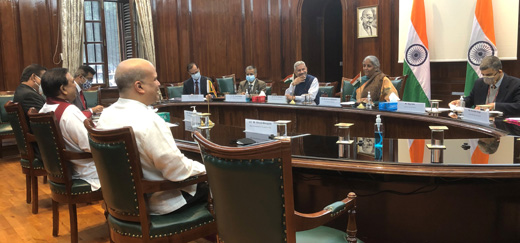
Basil Rajapaksa with India's Finance Minister Nirmala Sitharaman and External Affairs Minister Subrahmanyam Jaishankar
The Indian government has looked to expand several projects in the Tamil homeland, according to the latest press reports, as Sri Lanka’s finance minister Basil Rajapaksa faced criticism over his visit to New Delhi last week with claims that he “went to beg from India”.
Rajapaksa’s visit came as Sri Lanka sought crucial financial support from India amidst a deepening economic crisis and growing tensions between the neighbours.
He agreed a four-point economic plan with New Delhi, which alongside the offer of a much-needed currency swap to assist Sri Lanka during its financial crisis, also included “facilitating Indian investments in different sectors in Sri Lanka” and an agreement to develop the Trincomalee Tank Farm – a reversal from a previous Sri Lankan position.
Earlier this year, Sri Lanka reportedly scrapped a 2003 deal that saw 99 tanks in the eastern city leased out to the Indian Oil Corporation (IOC). "I am proud to announce that the oil tanks the use of which had been denied to us since 2003 will be soon ours," claimed Sri Lankan Energy Minister Udaya Gammanpila.
However, the new agreement with India stipulates the “early modernization of Trincomalee Tank Farm” – a project that New Delhi has been pursuing for several years. India’s Foreign Secretary Harsh Vardhan Shringla even visited the site in October, as Sinhala nationalists continued to demand Delhi be excluded from projects in the region.
Foreign Secretary @harshvshringla visited the Oil Tank Farms at Trincomalee today.LIOC briefd him about the development undertaken at the Lower Tank Farms and the possibilities for further strengthening India-Sri Lanka energy partnership to enhance SL’s energy security.@MEAIndia pic.twitter.com/tNhpNWv4OE
— India in Sri Lanka (@IndiainSL) October 3, 2021
India seeks more deals across the North-East
The announcement of the deal was accompanied by other reports of resurging Indian involvement in the North-East. Relations between New Delhi and Colombo have grown fraught this year, on the back of Sri Lanka cancelling several previously agreed deals. Recent weeks, however, have seen changes.
Last week, India's Adani group reportedly submitted a proposal to the Board of Investments of Sri Lanka (BOI) and the Ceylon Electricity Board (CEB) to develop a USD $1 billion renewable wind power project in Mannar.
Meanwhile The Morning reported this week that a Chinese project to develop three hybrid power plants in Delft Island, Analativu and Nainativu, worth an estimated USD$12 million has been cancelled.
“We originally intended to carry out this project under a loan from an international financial institution, and a Chinese firm was selected through the standard bidding process,” said Sri Lankan State Minister Duminda Dissanayake. “But the Indian Government has offered a 75% grant for this purpose, and, therefore, we have cancelled the contract for the time being.”
However, the Beijing-based Global Times cited “security concerns from a third party” as the alleged reason behind the contract cancellation.
“It is ridiculous that India uses security reasons to meddle in the project,” a source close to the company told the Global Times. “The Sri Lankan project is small, supplying electricity to villages on three small islands. Since the islands and the main territory of Sri Lanka are separated by the sea, it is very likely that the power grid will not be connected to other places in Sri Lanka.”
China has now instead moved the project over to the Maldives.
Sino Soar Hybrid Technology, being suspended to build Hybrid Energy system in 3 northern islands due to 'security concern' from a third party, has inked a contract with Maldivian gov't on 29 Nov to establish solar power plants at 12 islands in .https://t.co/ZhnETZYN6P
— Chinese Embassy in Sri Lanka (@ChinaEmbSL) December 1, 2021
‘Begging from India’
The announcement of the four-point deal, also comes as Sri Lanka faces an immense economic crisis. And despite having looked to India repeatedly for support, New Delhi has been stoic in its response.
At least two requests are known to have been made for economic assistance from New Delhi - a debt freeze request directly by Sri Lanka’s prime minister Mahinda Rajapaksa in February 2020 and a US$ 1.1 billion currency swap request from Sri Lanka president Gotabaya sought in May 2020.
Neither has been officially responded to, although the latest deal may lead to a currency swap, according to details of the agreement released by the Sri Lankan High Commission in India.
The Hindu reporting on the deal noted though that;
“However, the MEA and the Finance Ministry did not issue any statements on the outcome of the meetings in Delhi”.
Meanwhile in the Sinhala south, the Rajapaksa regime, known for its hard-line Sinhala nationalist stance, has come under fire for turning to New Delhi.
Former Sri Lankan prime minister and United National Party (UNP) leader Ranil Wickremesinghe told Sri Lanka’s parliament, “We have never seen Finance Ministers leaving the country while crucial public finance matters are discussed.”
“Our Finance Minister went to India and came back. We don’t know if he went to beg from India as well.”
We need your support
Sri Lanka is one of the most dangerous places in the world to be a journalist. Tamil journalists are particularly at threat, with at least 41 media workers known to have been killed by the Sri Lankan state or its paramilitaries during and after the armed conflict.
Despite the risks, our team on the ground remain committed to providing detailed and accurate reporting of developments in the Tamil homeland, across the island and around the world, as well as providing expert analysis and insight from the Tamil point of view
We need your support in keeping our journalism going. Support our work today.
For more ways to donate visit https://donate.tamilguardian.com.

